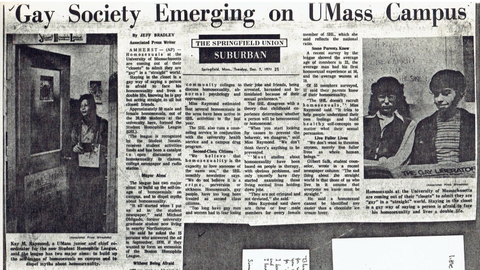Centered around National Coming Out Day on October 11, LGBTQ+ History Month is a 31-day celebration of lesbian, gay, bisexual, transgender, and queer achievement and influence on the world and a time to learn more about the history of LGBTQ+ rights.
The first state in the nation to legalize same-sex marriage, Massachusetts holds a significant place in LGBTQ+ history. As the Commonwealth’s flagship campus, UMass Amherst’s own past is infused with important events that were driven by or affected the lives of the LGBTQ+ community on campus.
Over the years, that community has grown to be robust, inclusive, supportive, welcoming, and deeply informed by the lessons and experiences of history. Consistently rated one of the best universities for LGBTQ+ students, joining UMass means joining a place that offers meaningful programming, support, mentoring, and social opportunities.
1970
Image

A group of students established the Student Homophile League with a mission to “serve the needs of the homosexual community of the five-college area” and “educate the community about homosexuality as a lifestyle and refute the myths about gay life.” The organization later changed its name to the People’s Gay Alliance; the Lesbian, Gay, and Bisexual Alliance; and finally to the Pride Alliance. Still in existence today, the Pride Alliance is the largest undergraduate LGBTQ+ student group at UMass, sponsoring weekly educational, cultural, and social events.
1976
The Lesbian Union was founded by undergraduate students at UMass. They held weekly meetings on specific topics relating to lesbians’ experiences with family, friends, discrimination, and relationships.
1983
Image

A series of hateful incidents against lesbian, gay, and bisexual students led to protests that called for UMass Amherst to provide more support to students in this community. In response to the protests, William Field, the dean of students, launched the Sexual Orientation Service Committee to investigate the existing resources and needs of lesbian, gay, and bisexual students and faculty. Felice Yeskel, a resident director and the clinical advisor to the Counseling Collective, was a prominent voice at committee meetings.
1984
The university commissioned a report on the campus climate for LGBTQ+ students—the first study of its kind to be sanctioned by a college in the U.S. Carried out by Yeskel, the report—entitled “The Consequences of Being Gay: A Report on the Quality of Life for Gay, Lesbian, and Bisexual Students at the University of Massachusetts”—recommended that UMass establish a center for LGBTQ+ students.
1984
Image

The administration and faculty senate moved to include “sexual orientation” in the university’s nondiscrimination policy.
1985
The Program for Gay, Lesbian, and Bisexual Concerns was established as an administrative office in Student Affairs with Yeskel as its director. It was just the third center of its kind on a college campus, after centers at the University of Michigan and the University of Pennsylvania.
1992
In response to LGBTQ+ students feeling unsafe living on campus, Residential Life established the Two in 20 Floor, the nation’s first residence community for LGBTQ+ students.
1995
Image

The Program for Gay, Lesbian, and Bisexual Concerns was renamed the Stonewall Center: A Lesbian, Bisexual, Gay, Queer, and Transgender Educational Resource Center. Named in honor of the New York City bar at the center of the 1969 uprising that was a key turning point in LGBTQ+ rights, the Stonewall Center has served as a model for many other colleges and universities. Today more than 150 LGBTQ+ campus centers and offices exist across the United States and Canada.
2006
Dr. Genny Beemyn was hired as the second permanent director of the Stonewall Center. They continue in this role today.
2007
Image

The UMass Department of Special Collections and University Archives received a gift of more than 1,000 books collected by gay rights pioneers and partners Barbara Gittings and Kay Tobin Lahusen.
2009
UMass Amherst added “gender identity” to the Policy Against Discrimination, Harassment, and Related Interpersonal Violence.
2009
To provide better support to trans students, UMass Amherst began to allow students to use a name of their choice on course rosters and more easily change the gender marker on their UMass records, require gender-inclusive restrooms to be included in renovations and new construction, and cover hormone therapy under student health insurance.
2010
Image

Based on its LGBTQ+-related policies, UMass Amherst was rated as one of the best colleges for LGBTQ+ students by Campus Pride, a national LGBTQ+ youth advocacy organization.
2013
The Two in 20 Floor was renamed Spectrum. Learn more about the Spectrum Dedicated Residential Community.
2014
Image

UMass Amherst basketball player Derrick Gordon became the first Division I men’s basketball player to come out publicly as gay. While Gordon’s coming out was big news nationally, it was less so on our campus, because there had been out athletes in many other UMass sports.
2014
UMass Amherst became one of the first higher education institutions in the U.S. to enact a formal bathroom policy to protect the rights of trans and gender-nonconforming people in their choice and use of restrooms.
2014
The Stonewall Center added the terms “asexual” and “intersex” to its full name.
2018
UMass Amherst hosted the Northeast Queer and Trans People of Color Conference, an annual gathering for queer and trans people of color aimed at cultivating a network and supporting dialogue about the complexities of intersections within and beyond the LGBTQ+ spectrum.
Image

2022
Campus Pride recognized UMass Amherst as a top LGBTQ+ friendly campus for the 12th consecutive year.







